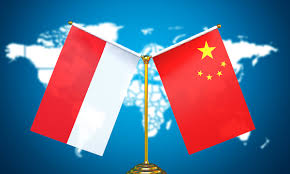Indonesia Reaffirms Sovereignty Amidst South China Sea Cooperation Talks
Indonesia’s Foreign Minister, Sugiono, has emphasized that the country does not recognize China’s territorial claims in parts of the South China Sea, specifically refuting any suggestion that a recent joint statement between Indonesian President Prabowo Subianto and Chinese Premier Xi Jinping implies recognition.
Sugiono clarified the statements made during a hearing with the House of Representative’s Foreign Affairs and Defense Commission I on December 2, 2024.
Joint Development, Not Recognition
“The text of the joint statement stipulated that Indonesia and China will pursue joint development in the areas identified as overlapping claims, relying on existing laws and regulations,” Sugiono explained. “We did not mention recognizing anything. There is no such statement saying we will work together at specific points A or Coordinate B. Not yet.”
He reiterated that Indonesian President Prabowo Subianto had directed a policy of increased collaboration and cooperation with neighboring nations, primarily driven by national interest.
Sugiono stressed that this focus on cooperation does not diminish Indonesia’s commitment to its sovereignty.
“We do not shift our position in the context of sovereignty,” Sugiono asserted. “That’s why it was written in the text – there are prevailing laws and regulations. Indonesia remains of the position that there is no international legal basis for the nine-dash line claim, and the joint statement did not mention this line.
Commitment to International Agreements
Furthermore, Sugiono affirmed Indonesia’s unwavering dedication to existing international agreements, including ratifications and implementations of existing bilateral agreements.
“Indonesia consistently upholds UNCLOS and the spirit of the Declaration of Conduct in the South China Sea,” he declared.
Code of Conduct Negotiations
Sugiono also provided an update on the ongoing discussions surrounding the Code of Conduct (CoC) for the South China Sea within the framework of the Association of Southeast Asian Nations (ASEAN): “Indonesia is actively engaged in discourse with ASEAN regarding the CoC. In 2023, ASEAN and China agreed to accelerate negotiations on the CoC, which have been ongoing since 2019.”
He highlighted the shared commitment among negotiating parties to finalize the CoC as a means to preserve regional stability and peace.
“All negotiating participants agreed that the CoC must be completed immediately to maintain the status quo in the region. We have a shared aspiration to create a calm, stable, and peaceful South China Sea region,” Sugiono stated.
Beyond ASEAN negotiations, the Foreign Minister revealed that the proposed code of conduct has been discussed with several leaders of neighboring countries with the aim of reducing tensions and fostering collaborative resource exploitation.
Moving Forward with Cooperation
Despite Indonesia’s firm stance on sovereignty, Sugiono emphasized that the country is actively pursuing cooperative avenues with China.
“For example, Indonesia and China will collaborate on fishing and resource exploration, based on the principles of applicable international law and mutual respect for the sovereignty of respective countries,” he concluded.
How does Indonesia’s approach to its relationship with China in the South China Sea balance national interests with upholding international law?
## Navigating Troubled Waters: An Interview on Indonesia’s Stance in the South China Sea
**Host:** Welcome back to the show. Today we are joined by Dr. Maria Santos, a leading expert on Southeast Asian geopolitics. Dr. Santos, thanks for being with us.
**Dr. Santos:** My pleasure.
**Host:** Dr. Santos, Indonesia recently held talks with China about cooperation in the South China Sea. Many observers saw this as a potential concession to China’s expansive territorial claims in the region. How does Indonesia’s Foreign Minister, Sugiono, explain this move, and how credible are his reassurances?
**Dr. Santos**: That’s a great question. Minister Sugiono has been very clear in emphasizing that cooperative development in overlapping zones does not equate to recognizing China’s claims. He points to the joint statement, noting it relies on “existing laws and regulations”, and importantly, avoids mentioning specific geographical coordinates or endorsing the controversial “nine-dash line”.[[[[
**Host:** So, is Indonesia trying to have its cake and eat it too – cooperating with China while simultaneously upholding its own sovereignty claims?
**Dr. Santos**: There’s definitely a strategic balancing act at play. Indonesia wants to reap the economic benefits of potential joint development projects in the resource-rich South China Sea, but it’s also wary of appearing to legitimize China’s assertive claim over the region. They’re walking a tightrope, trying to maintain a pragmatic relationship with China while staying true to their own interests and international legal positions.
**Host:** Some may argue that this approach undermines the international legal order. What are your thoughts on that?
**Dr. Santos**: This is where it gets complex. Some countries are indeed concerned about a pattern of bilateral deals chipping away at the UN Convention on the Law of the Sea (UNCLOS), which China has repeatedly challenged through its South China Sea ambitions. While Indonesia’s recent move might not directly contradict UNCLOS, it does highlight the ongoing tension between securing national interests and upholding a rules-based international order.
**Host:** Dr. Santos, thank you so much for shedding light on this intricate situation. It seems the South China Sea will continue to be a hotbed of geopolitical maneuvering for the foreseeable future.
**Dr. Santos**: You’re welcome. Indeed, the stakes are high, and finding a lasting solution that balances competing claims and respects international law remains a major challenge.
**Host**: We’ll be sure to continue following these developments closely. Thank you again, Dr. Santos.




